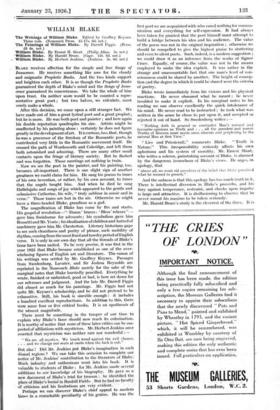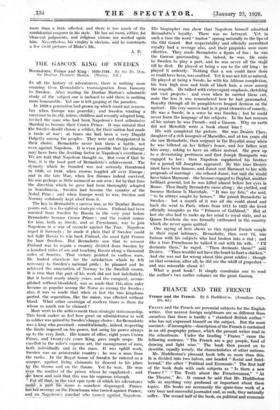WILLIAM BLAKE
The Writings of William Blake. Edited by Geoffrey Keynes. Three vole. (Nonesuch Press. £5 17s. 6d. net.) BLAKE receives affection for the simple and free Songs of Innocence. He receives something like awe for the cloudy and enigmatic Prophetic Books. And the two kinds support and heighten each other. It is as though the Prophetic Books guaranteed the depth of Blake's mind and the Songs of Inno- cence guaranteed its concreteness. We take the whole of him
upon trust. On neither score would he be counted a repre- sentative great poet ; but two halves, we calculate, must surely make a whole.
After this decision, we come upon a still stranger fact. We have made out of him a great lyrical poet and a great prophet ; but he is more. He was both poet and painter ; and here again his double reputation quadruples his size. Artists might be unaffected by his painting alone : certainly- he does not figure greatly in the development of art. It is curious, too, that, though hewas a • precursor of the freedom of the Romantic poets, he contributed very. little to -the Romantic movement itself. He
crossed the.path of Wordsworth and Coleridge, and left them both astonished and- admiring. There are many other small contacts upon the fringe of literary society. But he flashed and was forgotten. -Those meetings set nothing in train.
Now we see the poet in the painter, and his painting, too, becomes all-important. There is one slight sign of another greatness we could claim for him. He sang his poems to-tunes
of his own. invention, or rather, by his own account, to tunes that. the angels taught him. And when he died he sang
Hallelujahs and songs of joy which-appeared to the gentle and submissive Catherine, his wife, " truly sublime in music and in verse." Those tunes are lost in the air. Otherwise we might have a three-headed Blake, grandiose as a god.
The magnification of Blake has come by fits and starts. IIis gospel of revolution—,"' Damn' braces: Bless' relaxes "— gave him Swinburne for advocate ; his symbolism gave him Rossetti and Mr. Yeats ; his idealization of children and hatred of machinery gave him Ur. Chesterton. Literary historians gape to see such cleanliness and purity of phrase, such mobility of rhythm, coming from the most fixed and tawdry period of English verse. It is only in our own day that all the threads of Blake's fame have been united. To be ,very precise, it was first in the
year .1925 that Blake became established as one of the over- whelming figures of English art and literature. The canon of
his writings was settled by Mr.. Geoffrey Keynes. Passages
from. Swedenborg, Lavater, and Sir Joshua Reynolds are reprinted, in the. Nonesuch. Blake merely 'for the sake of the
marginal notes that Blake hurriedly pencilled. Everything he wrote, finished or unfinished, good or bad, is here aet down for our reference and judgment. And the late Mr. Darrell Figgis did almost as much for his ,paintings. Mr. Figgis had not
quite Mr.- Keynes's scholarship, and he did not pretend to be exhaustive.. Still,, his. book is sizeable .enough it includes a hundred excellent reproductions. In addition to this, there were some four or five critical books. It is an apotheosis of the utmost magnitude.
There must be something in the temper of our time to explain why Blake's fame should now reach its culmination.
It is worthy of notice that none of these later critics can be sus- pected of affiliationS with Mysticism. Mr. Herbert Jenkins once asserted that mysticism was neither rare nor wonderful :— - " We are all mystics. We touch wood against the evil chance. . . . and we change our seats at cards when the luck is out."
But alas 1 Did Mr. Jenkins put Blake's imagination in such dismal regions ? We can take this occasion to complete our
notice of Mr. Jenkins' contribution to the literature -of Blake.' Much- industry and enthusiasm -went into. his book. It is. valuable to students of Blake ; for Mr. Jenkins, made. several. additions to our knowledge of his biography. He gave us a' new document of Blake's trial for. treason ; . identified` the; place of Etake's burial in But be:bad no faculty: of criticism and his limitations are very .evident.. Perhaps we can discoyer -Blake's chief appeal to modern tilnee in a remarkable peculiarity of his genius. He was the
first poet we are acquainted with who cared nothing for commu-
nication and everything for self-expression. It had always been taken for granted that the poet himself must attempt to build a bridge between his idea and his audience. The value of the poem was not in the original inspiration ; otherwise we should be compelled to give the highest praise to stuttering and even to silent poets. Such, indeed, is a modern suggestion ; we could draw it as an inference from the works of Signor Croce. Equally, of course, the value was not in the means employed to make the idea explicit. It was rather in the strange" and unaccountable fact that one man's level of con-
sciousness could be shared by another. The height of concep-
tion End.the degree in which it could be shared- were the Criteria of poetry.
Blake wrote immediately- from his visions and his physical reactions. He never obscured what he meant : he never troubled to make it explicit. In his marginal notes to his reading we can observe excellently the quick intolerance of his mind. He never read to be instructed ; lie took what was written in the sense- he chose -to put upon it; and accepted or rejected it out of hand. So Swedenborg writes-:--
" Nothing doth in general so contradict Man's natural and
favourite opinions as Truth 'and . all the grandest and purest Truths. of Heaven.must needs seem obscure and perplexing to the natural Man at first View."
Lies and Priestcraft," comments Blake. " Truth is Nattge.". This irresponsibility seriously affects his own aphorisms and his system of morality. Mr. Ernest Short, who writes a solemn, painstaking account of Blake, is alarmed by the dangerous iconoclasm of Blake's views. Ile urges, in apology, that .
" above all, we must rid ourselves of the belief that Blake practised what he seemed to preach."
And the sadness is that this apology has too much truth in it. There is intellectual diversion in Blake's proverbs, and his fury against temperance, restraint, and checks upon impulse is- large and attractive. It is disillusioning to observe that he never meant his maxims to be taken seriously.
Mr. Harold Bruce's study is the cleverest of the three. It is
more than a little affected, and there is too much of the :confidential conjurer iri his style:. He hai nOrboni,:either, for .'elear-cut judgments, and ieligiouS. visions are wasted upon him: Nevertheless, his vitality is ObVioirs,-and he Constructs a few vivid pictures of Blake's life.
A. P.











































 Previous page
Previous page